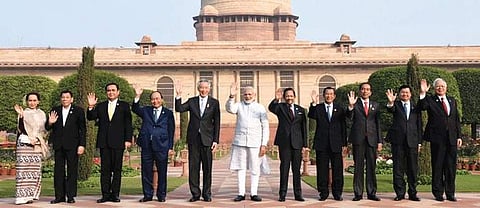

From January 24 onwards, it has been India’s foreign and security policy on display, starkly displaying success and failure. Let’s kill the negative first. With impunity Pakistan kept the LoC alive as we lost four bravehearts to a guided missile attack on a forward bunker exposing the fragility of our defence works and the necessity of infusion of more funds in the operational works. These have come to be neglected or wrongly prioritised in allocation of resources.
Pakistan chose to once again upset the apple cart and cause dilemma in minds of Indian security managers by taking the hybrid proxy conflict deeper into the hinterland. The dilemma for those who allocate and handle operational works-related infrastructure, is whether to concentrate on strengthening perimeters of vulnerable camps or focus on the hardening of defences at the LoC. There is greater dilemma of dealing with a Pakistan that appears strategically very confident with Chinese-backing and an apparently assumed disposition of having withstood American pressure on Afghanistan. Talks remain far from the horizon as India cannot afford to engage even as it fights Pakistan-sponsored terror and the raising of temperature at the LoC has limitations in achieving domination in the proxy conflict.
Now to the positives. The first is the grand spectacle of the 10 ASEAN leaders arriving at the Republic Day as guests of honour. The need for India to walk the talk on its Act East Policy has always been correctly perceived but a collective approach was never attempted. We have engaged with all the countries of ASEAN with shades of strategic sentiment, giving more importance to some and less to others. This was a good occasion to project a collective message that India was indeed serious about its relations.
It’s in the economic domain that the region matters much and better connectivity in the future will probably see a greater surge. However, it’s in the strategic domain that the relationship matters even more as China’s attempts to isolate India may go beyond the South Asian region. China does not wish India to be in control here because the region is also crucial as a gateway to the Indian Ocean through which flows much of China’s energy needs and container traffic. With talk of the Indo-Pacific and emergence of groups like the Quad (the US, Japan, Australia and India), the stakes have gone even higher. Thus giving ASEAN its deserved place under the sun made some excellent sense.
As it looks east, India just cannot neglect the west. It’s much like the US dilemma. Presidents George Bush, Jr and Barack Obama felt it right through their tenures. For India, the Middle East is just too crucial. Energy, diaspora, markets and ideological influences emanating from there are all relevant. The sectarian conflict that threatens the Middle East as well as conflicts related with radical ideologies, all have the potential for larger spread and the consequent turbulence none of which is in India’s interest. In 20 days we witnessed the visit of Israeli Prime Minister Netanyahu to New Delhi with display of much warmth including many promises of renewal of arms deals. India’s defence relationship is extremely important but it’s not quite possible to give its old and trusted relationship with the Arabs a go. That’s what saw Prime Minister Modi in Palestine receiving the hospitality of Palestinian President Mahmoud Abbas and being warmly feted. Thereafter the visits of the Indian Prime Minister to the UAE and Oman did the perfect balancing act.
The last word is reserved for the most challenging of relationships. Iranian President Rouhani’s return visit to New Delhi sustains a strategic equation India hopes will go far beyond. With a progressively functional relationship with the Middle East, including Iran, an emerging special relationship with Israel and a well orchestrated hosting of leaders of the ASEAN nations India’s foreign policy establishment can compliment itself.
Lt Gen (retd) Syed Ata Hasnain
Former Commander, Srinagar-based 15 Corps
atahasnain@gmail.com